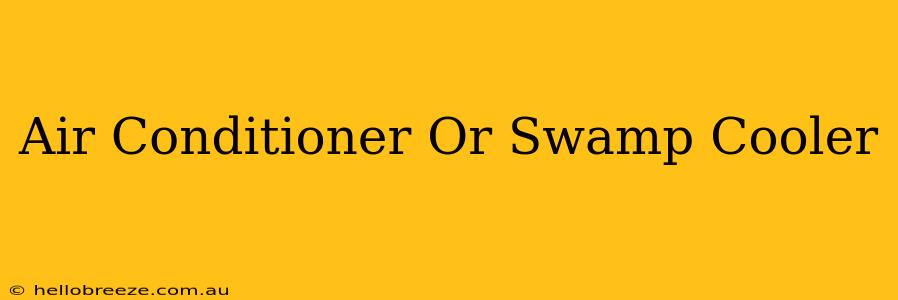Choosing between an air conditioner and a swamp cooler (evaporative cooler) can be a tough decision. Both offer relief from the heat, but they work in vastly different ways and are suitable for different climates and budgets. This comprehensive guide will help you weigh the pros and cons of each to make the best choice for your needs.
How Air Conditioners Work
Air conditioners, also known as AC units, use a refrigeration cycle to cool the air. A refrigerant absorbs heat from the indoor air and releases it outside. This process significantly lowers the temperature and humidity inside your home. Key features of air conditioners include:
- Effective in hot and humid climates: They excel at removing both heat and moisture, making them ideal for areas with high humidity.
- Precise temperature control: You can set your desired temperature and the AC unit will maintain it consistently.
- Improved air quality: Many AC units come with air filters that remove dust, pollen, and other allergens.
- Higher initial cost and running costs: Air conditioners are more expensive to purchase and operate than swamp coolers.
How Swamp Coolers Work
Swamp coolers, also called evaporative coolers, work by evaporating water to cool the air. A fan blows air across a wet pad, and as the water evaporates, it absorbs heat from the air, resulting in a cooling effect. Here's what makes swamp coolers unique:
- Energy-efficient: They consume significantly less energy than air conditioners, translating to lower electricity bills.
- Cost-effective: The initial purchase price is generally lower than that of an air conditioner.
- Best suited for dry climates: They work most effectively in arid regions with low humidity. In humid climates, they may not be effective and can even increase humidity levels.
- Limited temperature control: They offer less precise temperature control compared to air conditioners.
- Require water: You'll need a constant supply of water to keep the evaporative pads wet.
Air Conditioner vs. Swamp Cooler: A Head-to-Head Comparison
| Feature | Air Conditioner | Swamp Cooler |
|---|---|---|
| Cooling Method | Refrigeration Cycle | Evaporative Cooling |
| Climate | Hot and humid, any climate | Dry and arid climates |
| Energy Efficiency | Lower | Higher |
| Cost | Higher initial and running costs | Lower initial and running costs |
| Humidity Control | Excellent | Poor (can increase humidity) |
| Temperature Control | Precise | Less precise |
| Air Quality | Often includes air filtration | Typically no air filtration |
Making the Right Choice
The best choice for you depends largely on your climate and budget.
-
Choose an air conditioner if: You live in a hot and humid climate, require precise temperature control, and prioritize air quality. You're also willing to invest more upfront and pay higher operating costs.
-
Choose a swamp cooler if: You live in a dry climate, prioritize energy efficiency and cost savings, and don't need precise temperature control.
Consider these factors as well:
- Size of your space: The cooling capacity of both systems needs to match the size of the area you want to cool.
- Maintenance: Both require regular maintenance, but swamp coolers often need more frequent cleaning of the pads.
- Installation: Professional installation is often recommended for both types of cooling systems.
Ultimately, carefully considering your individual needs and local climate will ensure you select the most effective and cost-efficient cooling solution for your home. By understanding the pros and cons of each system, you can make an informed decision that keeps you cool and comfortable all summer long.

